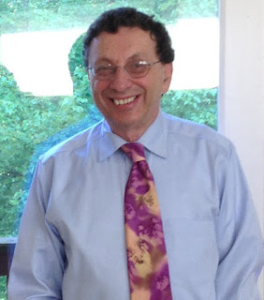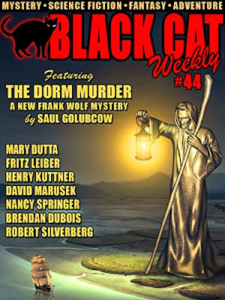Saul Golubcow, author of the Frank Wolf and Joel Gordon Mysteries
by Paula Gail Benson
I began reading Saul Golubcow’s stories in the issues of Black Cat Weekly Mystery Magazine. His protagonist, Frank Wolf, survived the Holocaust with his daughter and resettled from Vienna, Austria, to New York City. In his earlier life, Frank was a scholar, but proof of his academic background was destroyed by Nazis. Unable to pursue a career as a professor, Frank became a security guard for a library. Then, eventually, he set up an office as a private detective.
Frank Wolf, survived the Holocaust with his daughter and resettled from Vienna, Austria, to New York City. In his earlier life, Frank was a scholar, but proof of his academic background was destroyed by Nazis. Unable to pursue a career as a professor, Frank became a security guard for a library. Then, eventually, he set up an office as a private detective.
Meanwhile, Frank’s daughter marries and has a son, Joel. When Frank’s daughter is widowed, Frank steps in to help raise Joel, who makes them both proud by attending law school in the 1970s.
So far, there are three Frank Wolf mysteries, now collected in The Cost of Living and Other Stories.
I enjoyed these stories so much that I wrote Saul a fan letter. He graciously responded and agreed to answer questions for posts here and on Writers Who Kill. Today, he tells us about his background and previous experience with writing. Next Monday, we’ll talk about his stories.
SAUL GOLUBCOW:
I can’t say I’m an up and coming young writer but rather a “been there” baby boomer ready to write. As a member of what is called the “Second Generation” child of Holocaust survivors, I was born in a Displaced Persons camp in Germany after the World War II and came to the United States when I was two. I don’t remember how I learned English, but I am told my first English words were “push me” when sitting on a swing at my cousin’s house in Brooklyn. But even though we did not speak English in our house when I was growing up on a poultry farm in South Jersey, I somehow at a very young age came to love the English language, its nuances, choreography, possibilities for expression and meaning (perhaps much like a musician who is drawn to sounds and rhythms). I was that one kid in sixth grade who loved sentence diagramming.
I cannot remember a time I wasn’t reading, and so I believe expression through language became a part of me waiting for the right time for it to come out. I dabbled in high school writing immature fiction and newspaper articles. In college at Rutgers, I wrote short stories for the literary magazine, and my writing was noticed by an English Department professor who was the editor of a prestigious literary journal (I won’t drop names). He encouraged me to tend bar in New York after graduation as a way of nurturing my writing. But I am not temperamentally a Hemingway, or Kerouac, or Mailer type of person. I might properly be called “the writer as a homebody.” For instance, I am now married 50 years and still love my wife. So I used the Vietnam War and draft as an excuse why I couldn’t follow his advice and, instead, went into VISTA (Volunteers in Service to America, the stateside Peace Corp) and served in the South Bronx (an experience as good as bar tending).
I then worked for a weekly newspaper before heading off to graduate school at SUNY-Stony Brook earning a doctorate in English Literature (I got to read voraciously with a payoff). I wrote my dissertation on “Baseball as Metaphor in American Fiction.” As I indicate in the “Acknowledgments” section of my book, “in graduate school, I had started to scope out stories about Jewish Holocaust survivors in the United States. I had wanted to offer my perspective on these extraordinary people who came with their shattered lives to this wonderful country and, somehow, emphasized living and the future despite the death and destruction they had experienced.” One such character was to be Frank Wolf, loosely based on the personality of my father-in-law. I put these notes away in a desk drawer thinking I would soon come back to them. It took 50 years, as life including raising two wonderful children happened. I taught university level English for three years before leaving teaching and entering the business world (mortgage also happened). During those decades I wrote “thought” pieces on various American and Jewish cultural issues that appeared in different local outlets.
After receiving my doctorate, I taught English courses in Western Pennsylvania at a Penn State University campus and at Indiana University of Pennsylvania. My wife Hedy was also an academic, and when she was offered a position at the University of Maryland teaching school psychology, we couldn’t turn down such an opportunity, so we moved. But at that time in the late 1970s, we were in the midst of hard economic times (stagflation) with few jobs opening in English. So I left academia to work (ala Wallace Stevens) in an insurance company as a project director (two children and a mortgage driven also). But I did enjoy my work and also did pro bono teaching of my beloved English grammar to customer service representatives whose enthusiasm and thirst for growth was wonderful. From time to time, I tried to write fiction, but I think the exigencies of work and home life did not allow me to create new worlds (and perhaps I still had more growing to do). So I wrote non-fiction opinion pieces which were much easier to construct. But when I retired, the opportunity to create opened to me, and I said, “It’s time.”
When I retired six years ago, my writings increased dramatically. But I wasn’t satisfied as regularly I would pass by that desk with the aging notes inside. Finally a few years ago, I opened the drawer, retrieved the notes, and felt I was ready to fulfill my younger days’ mission. I’m not sure having tended bar would have hastened the fictional output, but my own version of “bar tending,” living my life and growing up and becoming older made me more ready. So I started writing stories about Holocaust survivors in the United States, and when I published a short story with Frank Wolf as Holocaust survivor turned private detective, I wanted (and encouraged by readers) to keep writing about him.
Please join us next Monday when I ask Saul about his fiction. If you haven’t already discovered him, I’m sure you’ll want to add him to your “to be read” list!

